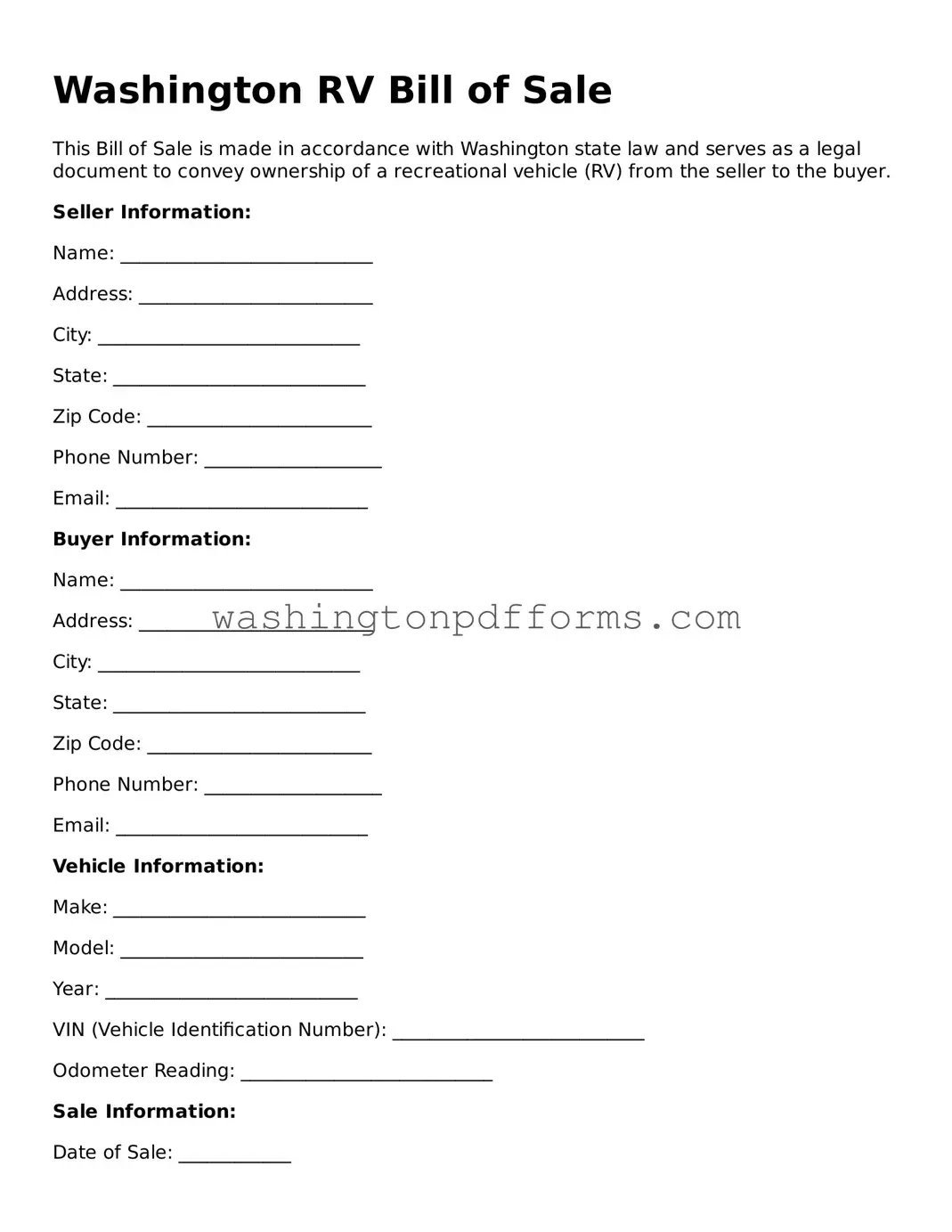Attorney-Approved Washington RV Bill of Sale Template
The Washington RV Bill of Sale form serves as a crucial document in the transaction of recreational vehicles, ensuring that both buyers and sellers are protected during the exchange. This form is not merely a piece of paper; it encapsulates essential details about the vehicle, including its make, model, year, and Vehicle Identification Number (VIN). Furthermore, it outlines the sale price and specifies the date of the transaction, which are vital for both parties. A properly completed Bill of Sale can help prevent future disputes by providing clear evidence of ownership transfer. In Washington State, this document is particularly important for registering the vehicle with the Department of Licensing, as it may be required to finalize the registration process. Additionally, the form typically includes spaces for both the seller’s and buyer’s signatures, affirming their agreement to the terms laid out in the document. By utilizing the RV Bill of Sale, individuals can navigate the complexities of vehicle ownership transfer with greater confidence and clarity.
Common mistakes
Filling out the Washington RV Bill of Sale form can seem straightforward, but many individuals make common mistakes that can lead to complications later on. One frequent error is failing to include all required information. Buyers and sellers must ensure that the form captures essential details, such as the names and addresses of both parties, the vehicle identification number (VIN), and the sale price. Omitting any of this information can create issues during the registration process.
Another mistake is not signing the document. Both the seller and the buyer need to sign the Bill of Sale to validate the transaction. If one party neglects to sign, the document may not hold up if disputes arise. It's crucial to double-check that both signatures are present before finalizing the sale.
People often overlook the importance of providing accurate vehicle details. This includes not only the VIN but also the make, model, year, and any other distinguishing features. Inaccurate information can lead to confusion or even legal challenges down the road, so it's vital to verify these details before submitting the form.
Some individuals also fail to date the Bill of Sale. Including the date of the transaction is essential, as it establishes when the sale occurred. Without a date, it may be difficult to prove ownership or resolve any disputes that might arise later.
Another common pitfall is not retaining a copy of the completed form. After signing, both parties should keep a copy for their records. This document serves as proof of the transaction and can be helpful if any questions about the sale arise in the future.
People sometimes neglect to check for additional requirements specific to their situation. For instance, if the RV has a lien or if it is being sold as-is, these details should be clearly stated on the Bill of Sale. Failing to disclose such information can lead to misunderstandings or even legal repercussions.
In some cases, individuals may not understand the implications of the sale. For example, if the RV is being sold with warranties or guarantees, those should be clearly outlined in the Bill of Sale. Not addressing these aspects can create confusion about what the buyer can expect after the purchase.
Finally, a mistake that often occurs is not understanding the importance of local laws. While the Washington RV Bill of Sale form is a standard document, local regulations may have additional requirements. Familiarizing oneself with these rules can help avoid potential issues and ensure a smooth transaction.
Similar forms
Vehicle Bill of Sale: This document serves a similar purpose in that it transfers ownership of a motor vehicle from one party to another. It includes details about the vehicle, such as make, model, and VIN, just like the RV Bill of Sale.
Boat Bill of Sale: Like the RV Bill of Sale, this document is used to transfer ownership of a boat. It typically includes information about the boat's specifications and the parties involved in the transaction.
Motorcycle Bill of Sale: This form is similar in function to the RV Bill of Sale, as it documents the sale and transfer of a motorcycle. It contains essential details about the motorcycle, including its identification number and condition.
Trailer Bill of Sale: This document facilitates the sale of a trailer, outlining the terms of the sale and the details of the trailer itself. It mirrors the RV Bill of Sale in terms of its structure and purpose.
Aircraft Bill of Sale: This form is used for the sale of an aircraft and includes specific details about the aircraft, similar to how an RV Bill of Sale details the RV. Both documents are vital for legal ownership transfer.
Business Bill of Sale: When a business changes hands, a Bill of Sale is often used to document the transaction. This document outlines the assets being sold, akin to how an RV Bill of Sale details the RV being transferred.
Personal Property Bill of Sale: This document is used for the sale of various personal items, such as furniture or electronics. It shares the same purpose of transferring ownership, much like the RV Bill of Sale.
Real Estate Bill of Sale: While primarily used for real estate transactions, this document serves to transfer ownership of property. It is similar in its need for detailed information about the property being sold, as is found in an RV Bill of Sale.
Farm Equipment Bill of Sale: This document is specifically for the sale of agricultural equipment. Like the RV Bill of Sale, it includes details about the equipment and the terms of sale, ensuring a clear transfer of ownership.
Some Other Washington Templates
Washington Prenup Agreement - This document can clarify expectations about financial contributions.
Divorce Washington State - The parent with primary custody often has rights outlined in the agreement related to decision-making.
Farm Tractor Bill of Sale - A Tractor Bill of Sale can include information about inspections.
